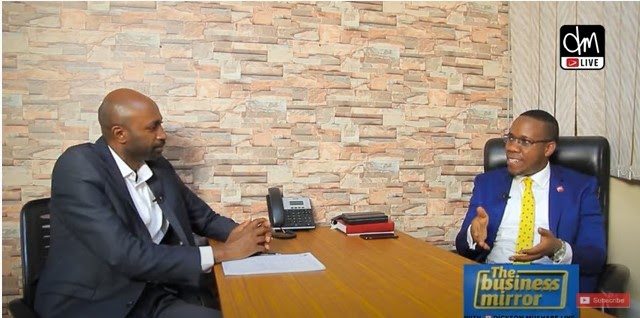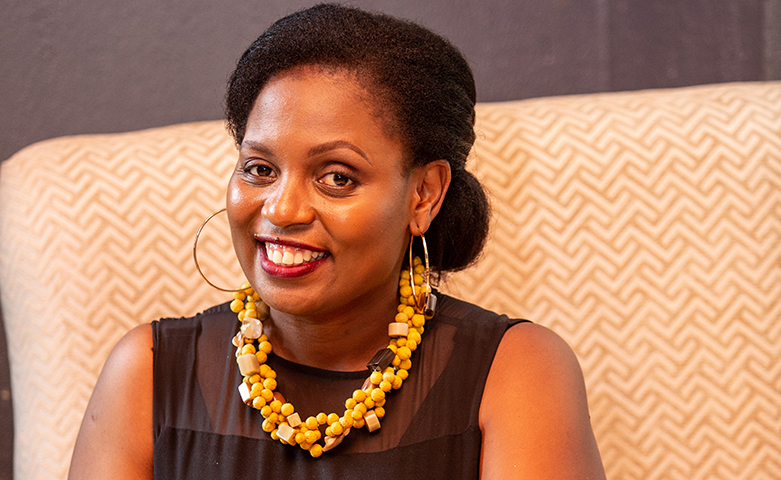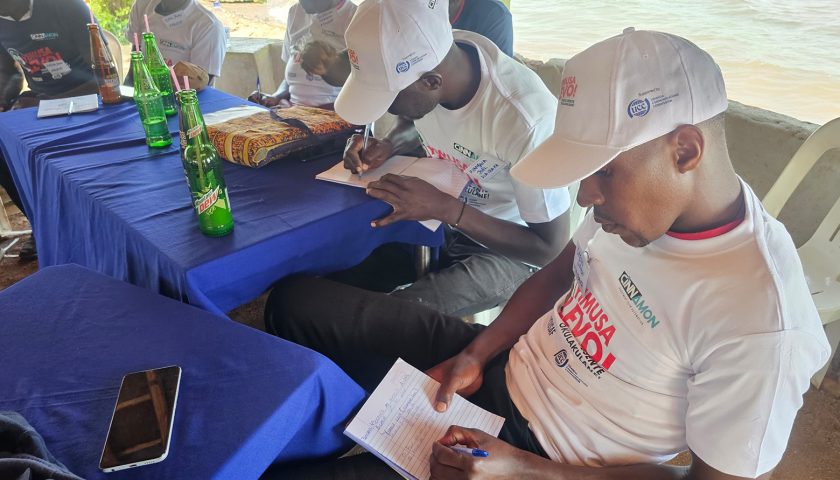So if the rights here are financial, where are the concerns that people will have? The concerns are that I don’t have autonomy both in terms of finance but also in exercising powers in making decisions. What you find many people doing in their partnerships is they’ll say: I’m partners with Dickson but we only share the costs. So, we share the costs, pay the rent and everyone takes home what they take home. We don’t do it that way here.
DM: Yes, I was coming to that.
AM: All the money is firm money. The challenge with that is that irrespective of who has made the money… and we can get into how then we do the sharing model and all that discussion. We can have that. But, I think the biggest challenge that people will have is a challenge towards the autonomy, in terms of their ability to make decisions.
But someone said: If you want to go fast, go alone. If you want to go far, go with others. I think it is a choice for us to make. To say: I want to go very fast, autonomous. Or I want to go very far with other people. As a result you end up impacting the lives of others in the process.
Last year, just to give you an example, I had an accident. I had an accident in a very disturbing kind of situation that I went through. I was down for about three months. Trust me, I could not come to work. Both my legs were broken. I was in a wheelchair, I couldn’t even use the steps. It was very difficult. I had to be lifted. But my partners, and to me that’s the reason for the partnership is that during those times you realise; wait a minute You’re actually mortal. Two, you have no full control like we like to think, over every affair of your life. You can fall sick. Many things can happen.
Imagine a situation where every time you fall sick, as a business owner, you close shop and go home and then your clients can’t access you. For me this whole partnership idea is actually a sign of selflessness even in relation to the staff, [00:12:00] in relation to the clients. That they should not suffer to have their salaries paid or clients should not suffer to be served because an individual is not in office.
When you come to deal with us here at the firm, you engage the firm. So, yes Dickson knows Alex. But, it has nothing to do with Alex at the point of engagement. You are engaging Signum Advocates as a firm. There will even be a clause that says yes the engagement partner might be Alex Matovu but the following people will be at your disposal. And if you have any concern that cannot be resolved between you and Alex, this is the email to send it to.
We are running an institution. It has nothing to do with the individual, it has everything to do with the institution that is serving you.
Do you know the founder of Stanbic Bank?
DM: No.
AM: How about Barclays?
DM: No.
AM: But Barclays is actually an individual. It’s someone’s name. But, they thought beyond themselves. Yes, the name could have been, or could be Barclays but the vision that they have is bigger. For me, that’s where I would be coming from.
Now, if there are other challenges, then It’s up to you to tell me what you think. Because you’ve said you’ve gone through them. Then, we can see.
DM: Let’s look at this. Two partners come on board. One is working, has a day to day job. The other one is at the firm. So maybe this person brings in cash, whereas this other partner brings in his sweat equity. Sweat. There’s usually a conflict because guys who bring in cash tend to think that they are more powerful or they do much more than the person who does the donkey work. Call it “donkey work”. How do you advise on that?
AM: For starters I’ve seen that many entrepreneurs interpret partnership or business support or financing to mean business partner. I think for starters, those two should be separated. If giving money or investing money in a business always meant being a business partner, then banks would be a partner in every business because they have the money.
[00:14:00] So, it’s not true that each time someone has money and another does not and I’m trying to pitch my idea or have my startup. Every time I come soliciting for funds, whoever gives me the funds becomes a business partner. That’s something that we should be clear about.
Number two, the nature of entities differ. There’s a company, there’s a partnership, there’s a joint venture company. There’s many other entities that we can talk about legally that can help to have what you call a partnership constituted. What do I mean by that?
If the amount of money I need is 50 Million today and you’re not going to be in the company henceforth, all you’re putting in is the 50 Million, and there will be nothing more, then we can talk about you investing as debt. Basically, you’re lending money to me. In that case, we wouldn’t even call it investment. We would just say there’s a debt.
But also, there’s what we call preferential shareholding. Yes you can lend money to me for a given period of time with certain expected returns in terms of interest. I pay you out within a given period of time of my entity running, or my business running. And, you’re out. So, you are a shareholder only for a given period of time for your money to be paid and the interest. You’re more or less a lender who is temporarily a shareholder.
The other option is to invest as equity. When you invest as equity then you are going to be a shareholder. Even that is very important for people to understand. When we start, we are excited so we say we’ll own at 50-50. But, I think It’s important to paint a picture of how this business is going to run beyond startup phase. The business is not going to remain in startup phase forever.
If one is going to operate and another is going to put in the money, the person who agrees to say it’s going to be a 50-50 yet both of them are not putting in the sweat must understand what that means. That if the company is worth 1 Billion tomorrow and it started at 50 Million and I put in my 25 and you put me as a 50% shareholder, then chances are high I’ll claim a stake even at 1 Billion because I am an equal shareholder in the company.
So, for me the structuring is something very critical. And, I think for many of these problems that arise, one of them being what you have just mentioned. [00:16:00] I think it has a lot to do with structuring. It has a lot to do with getting advice. When we tell people you need to hire a lawyer and all these things, they feel like expenses which should not be incurred. We’ve agreed on how to do these things, why do we need a lawyer? But it is extremely important.
In our case, I’ll just give you an example of how to solve that. We decided that no one would be a partner at Signum Advocates part time. I remember someone in our first year who brought computers. He said: Guys, I have computers I want to be a partner. For me that was amazing. We were quite… what can I say… we were quite not as informed as we are now and one of my partners almost agreed. He actually called me and said: Alex, someone is giving us all the computers we need. The question is, how much are these computers? Is this something that can really make you a partner?
Which then takes me to the question of how we then select, which I think we’ll talk about. How do you choose a partner? That one we can discuss. But, it is more than the money.
So for us it was important that you have full skin in the game. So that then, we don’t begin to compare who is doing more than the other.
What then that helps us is that the reason we are able to put money on the same account is not that we make the same amount of money as individuals. But, we have the firm as the bigger picture for all of us. This year it will be Dickson who makes more money, next year it will be Alex who makes more money. Imagine in the year where Dickson made more money we said Alex should not earn or get a dividend. Then, what happens the next year?
The nature of service also dictates how things work. I think for us, being a professional services firm, it’s really a question of practise area, they don’t peak at the same time. Today litigation and the people who go to court will make more money than the people who do advisory. Tomorrow it will be a different case.
Now, we are aware that the brand of the firm is a wholistic business or commercial firm that must have both advisory and dispute resolution. For me, that’s the background.
DM: Now, you know and maybe all startups know that lawyers are expensive. Wait. Is that true? Put that – I’m adding something. Lawyers are expensive. [00:18:00] They could be… expensive is relative but look at a startup. Someone who is just starting with his meagre resources. When you mention a lawyer, the first thing to do is to flee. Because they know, these are expenses. They don’t see any tangible benefit there and then. Maybe it would come to bite them later but right now, I can do without a lawyer because it is an expense which I could avoid. What do you have to say to a startup right now who is avoiding legal advice. Who is avoiding to come to you because he thinks a lawyer is expensive?
AM: I think that there are quite a number of things to talk about. Number one is to understand that every business has startup costs. If you are able to know that I need money for rent, why should it be difficult to understand that you need legal advisory. In my view, you need more of the legal advice as you start up, than the rent. You can work at home but you can’t do without proper advice.
So, that’s the starting point. Two, we know that more and more, firms are being started which are able to think through how to support startups. How I’ll charge Dickson, an established businessman is not the same as how I’d charge a startup.
I’m working with a number of startups now with two organisations. One is called HIIL; Hague Institute for Innovation in Law.
The other one is a program going on right now called The NSSF MUBS High Innovator Challenge. Essentially they are getting businesses, getting them into competitions and they get to pick out the best ideas and then support them. Part of that process is that NSSF would then fund whoever is supporting. So if it is a legal firm that is supporting, whatever it is the support they need, it is funded by another funder altogether. There are many programs that are coming up. That’s why you have the Innovation Hubs, like Innovation Village and all the spaces. Ideally they are meant to bring together these startups that are serious about what they are doing, that understand the value. I think there’s a difference there.
We confuse value with price. [00:20:00] And that’s why much of the time for me the debate is not on price, the debate should be on value. If someone understands the value, then we can agree on a payment plan. Then, we can agree on where they are and what they can afford to pay.
But, for me it is critical to understand that this advice is necessary. It is critical to understand that this advice is as important as any other expense or even more important.
[END OF PART TWO]
You too can share your story or journey. Send it to editor@postdator.com




